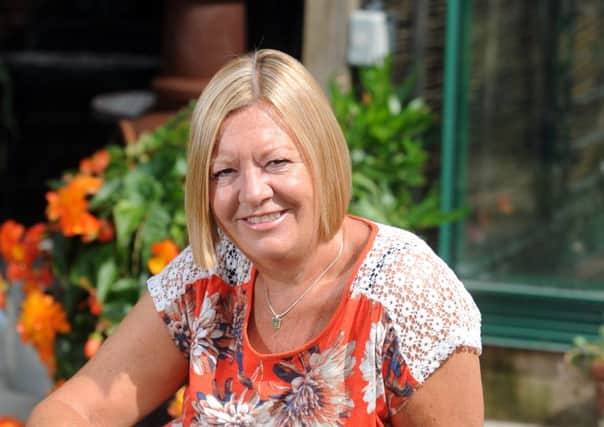More funding, but pancreatic cancer still no the rise in Yorkshire


It is the fifth most common cancer and is one of the few that is on the increase.
Historically it has been underfunded compared to other cancer, but two years ago Cancer Research UK pledged to tackle this form of cancer head on.
Advertisement
Hide AdAdvertisement
Hide AdThe charity has tripled its investment in pancreatic cancer, one of the hardest cancers to treat, since launching its research strategy in 2014. The charity increased spending on pancreatic cancer research - including improving diagnosis and treatment – to £18m in the 2015/16 financial year, tripling the £6m investment in 2013/14.
One of the charity’s aims is to help tackle the rising rates of pancreatic cancer, in particular among women, as well as improving poor survival from the disease.
One woman who knows all too well the problems of pancreatic cancer is Karen Stead from Wakefield.
Karen was diagnosed in 2010 after she started with abdominal pains and suddenly turned yellow. She underwent an operation called Whipple’s procedure.
Advertisement
Hide AdAdvertisement
Hide AdThe most common type of surgery for pancreatic cancer, the surgery lasted eight hours and involved removing part of the pancreas, stomach, small intestine, as well as the bile duct and gall bladder. The remaining parts are then reattached to the intestines, but as part of the pancreas has been removed, patients must take enzymes to help digest food afterwards.
After recovering, Karen, now 57, took part in a clinical trial of chemotherapy, but had to stop for medical reasons – a blow as she had banked on the treatment getting rid of any remaining cancer cells.
“After that, there was nothing more they could give me,” she said.
“Pancreatic cancer is different cancer as it completely changes the way your body works. I have to live with that everyday.”
Advertisement
Hide AdAdvertisement
Hide AdThe mum of two and step mum of one has received help and support from Wakefield Hospice and she and her family have raised more than £5,000 for Pancreatic Cancer UK (PCUK).
She has also set up a support group, Panpals for people with pancreatic cancer and their carer, as she felt she could have had more support and help when she left hospital.
Karen today welcomed the increased investment in tackling the disease.
“It is great news that Cancer Research UK is investing more in research into pancreatic cancer, but it is still not enough,” says Karen.
Advertisement
Hide AdAdvertisement
Hide Ad“In reality it needs £25m a year rather than £18m. It doesn’t get the investment it needs because the outcome for people with pancreatic cancer is so poor. Only four people in 100 lives for five years.”
In 2014 Cancer Research UK recruited world-leading pancreatic cancer research expert, Professor Andrew Biankin from Australia, to work at the Cancer Research UK Glasgow Centre.
Professor Biankin now leads a team helping to unearth the genetic and molecular secrets hidden within the biggest collection of pancreatic tumour samples in the world. His findings could lead to better ways of matching therapies to patients, and uncover new avenues for treatment.
Professor Biankin said: “Pancreatic cancer is an inherently aggressive disease and it’s often diagnosed late, which puts it a step ahead of us when we come to treat it. We need to be more ambitious and hit the disease hard and fast with new approaches. We need to diagnose these cancers swiftly so patients can get onto clinical trials which may help them.
Advertisement
Hide AdAdvertisement
Hide Ad“Throughout my career I’ve been determined to increase how much we know about pancreatic cancer. Right now, I’m studying differences in pancreatic cancer cells to find new ways to predict the best treatment for each patient.
“Increasing the amount of research taking place in the UK allows us to be much more optimistic about the future of beating this cancer.”
As for Karen, who is about to become a grandmother for the second time, she is still working hard to raise awareness of the condition.
Today she is holding a cake stall and tombola at Bexley Wing Atrium at St James’s to raise money for the hospital and the Panpals.
Advertisement
Hide AdAdvertisement
Hide AdAnd her son James Farrer is embarking on a 100 mile sponsored bike ride this weekend to raise money for Pancreatic Cancer UK.
Sponsor him at www.justgiving.com/fundraising/James-Farrar2
FACT FILE
Only one in every 100 pancreatic cancer patients in England and Wales survive for more than ten years and this has stayed the same since the 1970s. In Yorkshire and the Humber, pancreatic cancer incidence rates have actually increased by 11 per cent in the past 10 years. Around 600 people died from pancreatic cancer 10 years ago, today around 720 die from the disease.
For more information on how to help beat cancer sooner visit www.cruk.org